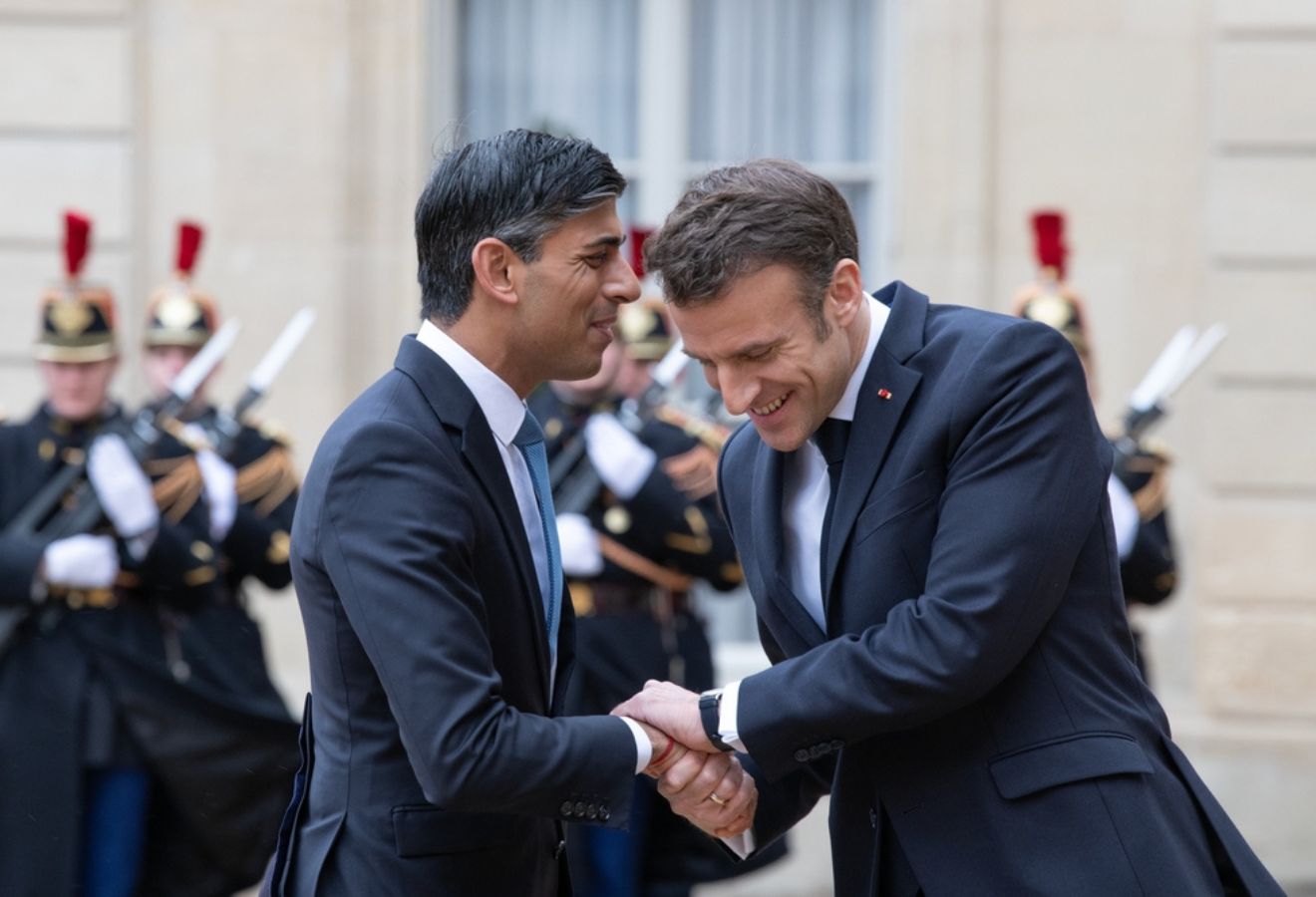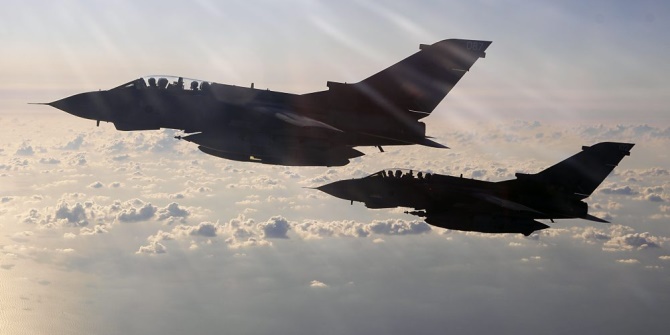 The government seems to be preparing the ground to expand British bombing of ISIS targets, from Iraq into Syria. But if the only good argument for doing so is to gain credit with our allies, are there really any ‘good’ reasons at all? Joe Devanny responds to a recent article by James Strong.
The government seems to be preparing the ground to expand British bombing of ISIS targets, from Iraq into Syria. But if the only good argument for doing so is to gain credit with our allies, are there really any ‘good’ reasons at all? Joe Devanny responds to a recent article by James Strong.
Defence Secretary Michael Fallon’s “pitch-rolling” comments last week, seemingly preparing the way for the public and parliament to contemplate British bombing of ISIS in Syria, have made it possible for us to marvel yet again at the hardy perennials of debate about British military intervention. Too often, these boil down to the flawed logic of “something must be done, bombing is something – bombing it is, then”. But I was surprised to find myself agreeing with all bar one of the academic James Strong’s arguments in his recent LSE blog, which cautiously advocated British bombing of ISIS targets in Syria.
Strong very cogently identified the complexities of the conflict, the inextricable links between the front in Iraq and that in Syria, but also the limitations of a bombing campaign against ISIS that is not backed up by credible ground forces, and the less than savoury nature of many of the armed groups in Syria that would either need to provide this credible force or would stand to benefit from international efforts to eliminate ISIS.
Strong also rightly cautions that the UK should make sure it has a compelling legal basis for intervention. We all remember what happens when people feel that hasn’t been done. Finally, he was correct to point out that the major difference between September 2014 – when the UK backed participation in bombing ISIS targets in Iraq but not Syria – and today, is that following his recent election victory, Prime Minister David Cameron now has a more realistic (although by no means certain) chance of securing a parliamentary majority for bombing ISIS in Syria.
I agree with Strong on all this. But he makes one further step that I cannot take with him. He argues that the symbolic political capital Britain would bank with its allies in participating directly in the Syrian bombings tips the balance in favour of doing so. Whilst this is far from falling into the “we must do something, bombing is something…and nothing short of bombing counts as anything” school of argument, Strong is nonetheless relying on some implicit premises which deserve to be teased out for explicit discussion.
The negligible impact of UK assistance in bombing ISIS in Syria has already been well argued by Shashank Joshi here. So what interests me is the plausibility of Strong’s claim that the political capital at stake is so desirable that it makes up for the less than compelling case in favour of expanded bombing.
Strong’s argument is essentially about the vitality of Britain’s diplomatic relationships, especially with Nato allies, most importantly the US government. It goes without saying, but Britain’s relationship with the US, and with each of its other allies, is multi-faceted, rich and much deeper than the issue of the precise configuration of the UK’s contribution to the campaign against ISIS.
You start with entirely the wrong sense of perspective if you ask the question “what message will we send to our allies by our decision whether or not to join in bombing ISIS in Syria?” The right question to ask is “how does our decision on this issue affect our allies’ perceptions of the totality of their relationships with the UK?”
This is a much bigger canvas and helps put things in their proper context, which includes the full weight of the UK’s global contribution to military, humanitarian and other endeavours, to say nothing of the burgeoning commercial and cultural relationships we have with each of our allies. It is a peculiar, mole-like tunnel vision view of the world that can characterise our most important diplomatic relationships as so brittle and fragile that a marginal call on whether or not to bomb a few targets in Syria would make or break them.
Even regarding the conflict with ISIS, the balance sheet contains more assets than a simple “to bomb or not to bomb” framing of the question would suggest. For example, there is the current UK contribution to bombing in Iraq, but there are also the UK’s other military, logistical, intelligence, diplomatic and humanitarian contributions to the total allied effort to address the crisis in Iraq and Syria. The UK government risks belittling its existing contribution by implying that only by bombing targets in Syria can we truly pull our weight and satisfy our allies.
During the Vietnam War, Prime Minister Harold Wilson assiduously avoided the commitment of UK soldiers to assist the US military operation. He did, however, offer substantive support of a different kind. The Special Relationship may have been tested, but it survived. No-one, I hope, would even try to argue that the operation against ISIS falls in the same league as Vietnam, so I strongly expect that the UK-US relationship would continue to be just as special without recourse to bombing Syria. (In fact, you would worry about a relationship that would be jeopardised by this, wouldn’t you?)
Strong pertinently observed that UK public opinion could well be shifting in favour of bombing ISIS in Syria. If public opinion was persistently and clearly in favour of British participation in the bombing campaign in Syria, then the government would most likely have its best chance of securing a parliamentary majority in favour of intervention – legislators would be that much less nervous about the negative reaction of their constituents.
But it is interesting to speculate whether this reported shift in public opinion would be changed (accelerated or reversed) by a more informed, deliberative national debate about the relative merits of UK involvement in bombing Syria, one which engaged with the issues in their totality and led citizens through the relative merits of each option. Such a debate ought to be a precondition for any claim that there is a popular mandate in favour of elective British military interventions like this one. It is unfortunate, then, that such a debate is also extremely unlikely to occur.
 Joe Devanny is a postdoctoral research associate at the Institute for Government and the Policy Institute at King’s College London. He works on the AHRC-funded Contemporary History of Whitehall project. He holds a PhD in political theory from the University of Cambridge. He tweets from @josephdevanny.
Joe Devanny is a postdoctoral research associate at the Institute for Government and the Policy Institute at King’s College London. He works on the AHRC-funded Contemporary History of Whitehall project. He holds a PhD in political theory from the University of Cambridge. He tweets from @josephdevanny.







Is the UK prepared to increase its forces to take on bombing Syria, or is it just going to redeploy those in Iraq ? If so what is the sum gain?
What proportion of the regional western commitment is UK?